March 15 - 21, 2020: Issue 442
Owen Ravenscroft
In January 2020 the wonderfully kind and gentle Owen Ravenscroft passed away. On Friday March 13th, 2020 friends and family gathered at Palm Beach for a beautiful Paddle Out and Tribute to Owen. Requests to rerun Owen's Profile page from friends and residents were held over in a mark of respect to his family until this time.
Owen was a son, husband, father, a writer, a goofy footer, and a man of great integrity with a great capacity to share his wonderful smile and laugh with all.
.jpg?timestamp=1584161423306)
.jpg?timestamp=1584161723623)
.jpg?timestamp=1584161851228)
.jpg?timestamp=1584161444072)
.jpg?timestamp=1584161469104)
Owen's Paddle Out at Palm Beach on Friday - photos by Mike O'Flynn, friend of O.
Owen featured as the Pittwater Online January 2014 Artist of the Month sharing an extract from his book ‘Sink or Swim’ – a great read for anyone with a passion for the ocean or for residents and visitors alike. To open our 2014 Summer Mix we spoke to Owen about his story and where his work evolved from.
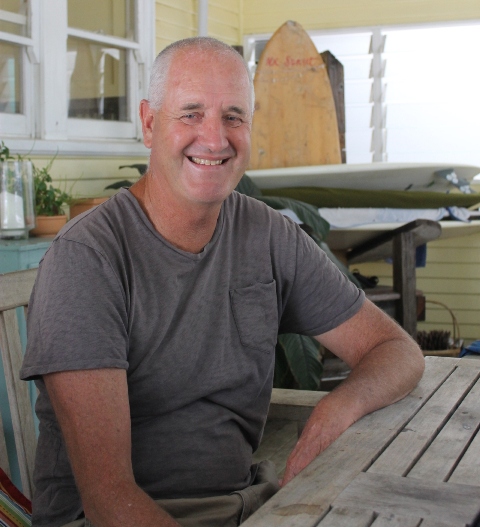 Where and when were you born?
Where and when were you born?
I was born in a car on my way to hospital on the 23rd of March, 1956. Apparently my mother was in the back seat and I was screaming. My father said ‘What’s that noise?’. My mother was saying ‘it’s the baby, it’s the baby’ and his reply was ‘Don’t be so bloody stupid!’.
So you were quite impatient then?
Quite impatient and unfortunately it’s a trait I still carry today.
Where did you grow up?
We moved around a lot; I started life in Pymble. At age four we went off to Brisbane for four years then back to Turramurra. I think I’m fortunate in that I can still recall a lot of memories from those early years. Dad’s work took us to Perth when I was fourteen. That was a fantastic year. We lived right on the beach, a bit of a change from Turramurra. I was really down about returning to Sydney. By this stage my brother and I were very keen surfers and my parents got sick of driving us to the beach each weekend so they said ‘that’s it, we’ll move to the coast’.
We moved to Sunrise Road at Palm Beach which was fantastic. That was 1972, it was affordable, we could do it. The plan was to rent for twelve months and if everything worked out they would buy a place. The move did a lot for my surfing but not much for my education. The plan fell apart when my parents split up. We became a bit gypsy like, moving around to different places on the peninsula, it was a great life.
What was Palm Beach like in the 1970’s?
It was different. There was a strong board riding presence at Palm Beach then, mainly due to the Peninsular Board Riders club. Back in 74/5, when our parents parted, our mother took a lease on 'the Hideaway', a neglected mansion tucked up behind the Palm Beach Golf Club.
As a means of subsidising the rent she let rooms to vagabonds and drifters (our friends from the beach!). Fortunately, one of the said drifters was Hugh Litchfield. Hugh had the foresight to always carry a camera. Out of the blue he sent me 300 images just before Christmas.
Youngest brother Mike (a.k.a. the Bod) saw this pic of me and said I must have been going through my Peter Frampton phase. From memory, I had just approached a fork in the road, I turned left.
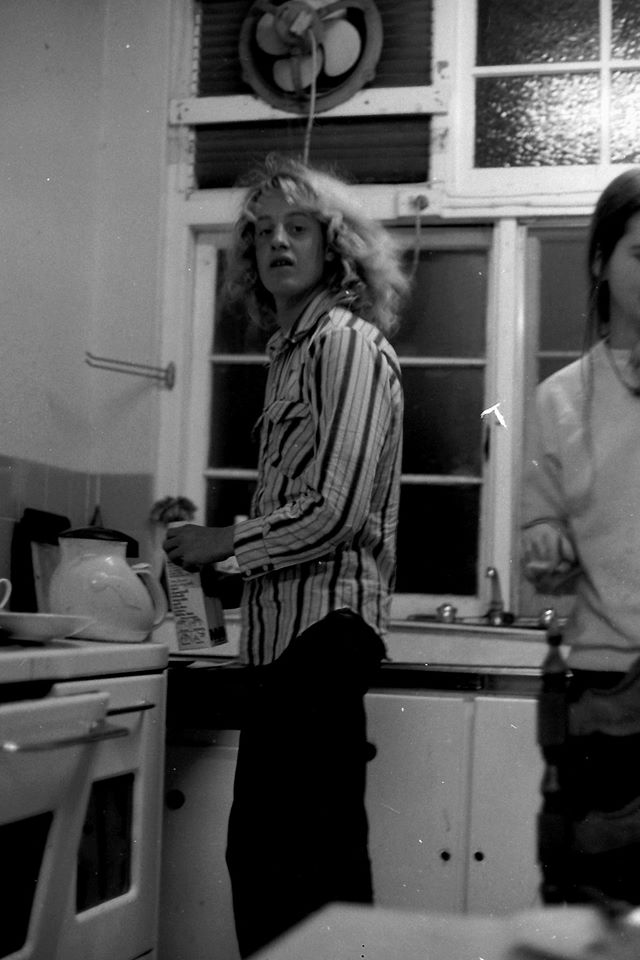
Owen 'Peter Frampton' Ravenscroft
What sort of boards were you riding?
It was at the tail end of a transitional period going from long boards to short boards. We were just coming off the super short stubbies and twin fins to more refined, and sensible, shapes. ‘Peninsular’ was a strong and prestigious club. Guys and girls came from all over the state to be at Palm Beach. You had the sons of judges mixing with brickies labourers but everyone was equal on the beach – there were no airs or graces. When I think about it now, looking back at how it all worked, it was special.
But it was also a time when a lot of guys, when they got to their mid or late twenties, got married, had children, careers, they walked away from surfing. As Palm Beach became more of an enclave for the wealthy, there wasn’t a group of young local guys coming through to fill the void. It’s a shame but there’s not much of a strong local presence at Palm Beach these days. Some people would say this is a good thing because we used to cause a bit of trouble – it was a great upbringing though, I was exposed to a lot.
When did you first start surfing?
We were still living at Turramurra and I got a surfboard for my 11th birthday. My mum drove me down to Brookvale and the first factory we walked into was Scott Dillons’. I spied a nice board in the second-hand rack – most boards at the time were about 8’6, I was fairly small for 11, and I found a nice little 6’3, which was unusual for the time. It was $60.00 and I remember my mum writing the cheque and Scott Dillon said ‘Now we’ve got you sorted, maybe we could organise a board for your sister.’ in reference to my mother. Quick as a flash she replied ‘did you want another couple of zeroes on this cheque?’
Scotty had a reputation as a bit of a character and he didn’t disappoint.
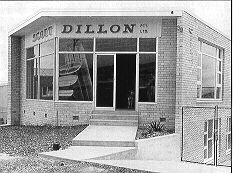 Right: Scott Dillon Surfboards, 39 Winbourne Road Brookvale Sydney. circa 1965 Photograph courtesy Scott Dillon Collection
Right: Scott Dillon Surfboards, 39 Winbourne Road Brookvale Sydney. circa 1965 Photograph courtesy Scott Dillon Collection
We went off for a surf at Dee Why straight away, I failed miserably. Within a week or two my best friend and his younger brother had surfboards. The parents would jockey the chauffeuring duties to the beach. Surfing really took over my life from then on.
That board in the corner there made into part of a throne – what’s the story behind ‘Mr Sunset’?
Mr Sunset is the title of a famous biography of Hawaiian surfer Jeff Hakman. It was written by Phil Jarrett who did a cracking job by the way. We had that chair in our surf shop at Newport – it’s an old balsa board that we found at the tip cut in half. It’s a shame it had been cut in half because it would look beautiful fully restored. Some clever guy built it into that chair and when Jeff Hakman came to Australia to do his book signings around the place the chair went with him. It lent the occasion a sort of regal presence.
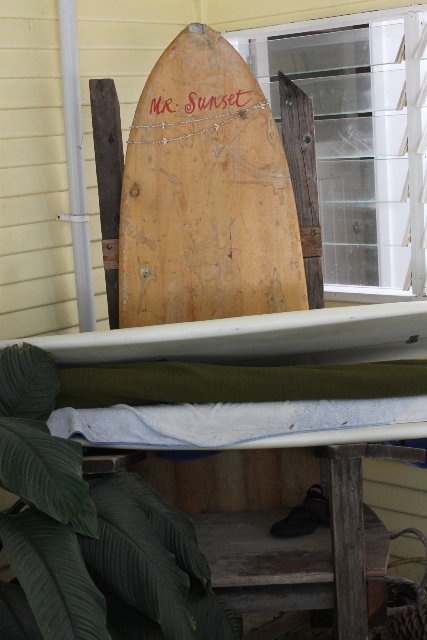 It’s a great book. Jeff was a champion surfer at a very young age but developed a heroin habit. This wasn’t unusual in surfing at the time. He fell over a few times after his initial rehab but he’s a strong man and he came good in the end. He became a partner in a very successful Quiksilver license, lost his way but made a successful comeback. Last I heard he was living in Spain and surfing his brains out.
It’s a great book. Jeff was a champion surfer at a very young age but developed a heroin habit. This wasn’t unusual in surfing at the time. He fell over a few times after his initial rehab but he’s a strong man and he came good in the end. He became a partner in a very successful Quiksilver license, lost his way but made a successful comeback. Last I heard he was living in Spain and surfing his brains out.
What did you do post-school?
I finished school in 1973 – did my Higher School Certificate, which I just got by the skin of my teeth. I drifted for a while doing odd jobs. By this time my father had gone and my mother had made the decision ‘I can’t fight these kids, I’m just going to join the party and go along for the ride’, which was a wise decision on her part. We loved mum, it was great having her as a friend as well as a mother; we got away with a lot but she always had her eye on us. She worked really hard to make sure we had a good time, we didn’t appreciate it at the time, but later on we did.
My working life started off in some friends screen printing shop. They made surfboard wax as a sideline. Working there was a lot of fun. I worked in a few surfboard shops doing a few of the dirty jobs that no one else wanted to do but it was great being around surfers and surfboards.
I did this for a year or two and then could see how my mum was struggling a little; without saying it, she didn’t like the path I was taking. I decided I was going to change things around – I wasn’t a bad kid but I wasn’t conforming – so I became a trainee manager at Coles, which was a complete change of direction. I didn’t really like it but it opened my eyes to a lot of things, just seeing how business worked for a start and working with other people that were different to me. I did that for a year or two and then made a decision that I was going to travel overseas, so it was all about saving money.
I left there and started labouring. I worked for two Yugoslav guys around here and they got their pint of blood, let me tell you. They were great guys but we worked hard. I’d met the girl who is now my wife and she went to Europe for four months and I went to the US and Central America for four months. I was travelling with my brother and two friends. We landed in San Francisco bought a van and headed south. Mexico was great. None of us were flash for funds. Our staple was tortillas, hot sauce and avocados which cost nothing. After surfing all day you didn’t really care what you were eating, so long as there was plenty of it.
This was 1980 – after Mexico we went down to Guatemala across to Belize and back up to the US. There were a few little side trips to the Bahamas and other places.
What sticks with you from there now?
That was my first travelling experience where you’re not accompanied by adults and you realise you are really in a foreign land – I was really excited then, and I still am now, just to be in a place where you are with local people, just listening to them speak, looking at them, what they’re wearing, what they’re eating. I love it, it just fascinates me. Even now if we go somewhere, we’re not in hotels that often. We try and find a little guest house, get friendly with the locals and off the main strip, into the place’s underbelly. That first trip instilled that in me.
When I returned from that first trip my girl came home around the same time, it was time to get a real job. I got into the corporate scene for a while and worked with some large companies and did ok as far as going up the ladder. I was with a large importing company which had three different divisions – chemical, timber, and general importing. I worked in general importing starting as a sales rep. then worked my way up. The firm made a decision to get rid of my division. One of the directors in Melbourne decided he’d take it over and start his own business and asked me to run his office in Sydney. This was a lot of pressure and when I look back at it, I was only still in my twenties and it did take a lot out of me but at the same time I did enjoy it and he was a very nice guy to work for.
Unfortunately he went broke through another set of circumstances and so I started my own business, doing what I could afford to finance. We were importing anchovies from Spain, tamarinds from India, little bits and pieces from here and there. Things were great for a couple of years. We called the company ‘Avalon Steamship’.
At the time there was a firm in the news for good and bad reasons, ‘Adelaide Steamship’ which was run by an entrepreneur named John Spalvins. We used ‘Avalon Steamship’ as a play on that.
We sold off bits of it after a few years – it was an age where communications were getting better and the people we’d been dealing with didn’t need to deal with us, they could deal directly with others so we got cut out of the picture. It was a shame it didn’t continue on but at the same time we were lucky to have it while we did.
I had about six months off, not doing much at all. A good friend of mine, David Watson who has Beach Without Sand surf shop down here at North Avalon, opened a shop in Newport which was affiliated with Quiksilver. He said’ if you’re not doing much, why don’t you go and look after that shop for me?’
I did this for a few years while David concentrated on his baby at North Avalon. David wasn’t comfortable with constraints of the Newport operation and we ended up buying that part of his business. We changed it to the Newport Surf House and became an independent store. We were there for nearly eight years.
The first few years were a lot of fun, it was a really neat business. Unfortunately the surf companies experienced such massive growth they outgrew their market. All of a sudden there was all this stock out there being sold at distressed prices. The suppliers were getting their money but it put a real squeeze on the retailers. Our business was still viable, it was just tougher. We probably would have stayed in it if we had the opportunity to purchase the freehold but the owner wasn’t interested in a strata situation.
We sold the business and fortunately the guys who bought it had a good few years. I think a few partnership issues arose and that’s when they closed down.
I had a bit of time off then and didn’t know what to do. One of Hollywood’s attempts to make a surf movie was called ‘Big Wednesday’. The main character was ‘Matt Johnson’, a talented surfer who had a drinking problem. He scraped a living through cleaning pools. For whatever reason, his image made an impression on me. I was looking through the paper and saw a pool cleaning franchise for sale in this area. I was very wary about buying a franchise but I went and met the guys up at Forestville. It was a ‘try before you buy’ deal so I jumped in. For a year or two it was really good fun – I didn’t have the hassles of rent or staff, I was just working my own hours and I’d never really done that much with my hands so it was nice learning new skills and working outdoors.
Unfortunately the guy who owned the business became ill and sold it to another group. Our franchise agreement was assigned to the new owner. The new crowd were everything I’d heard that was bad about franchising. I persevered for about five or six years sporadically trying to sell the business. The situation was doing my head in and I decided to end it ‘come hell or high water’ and trade on independently.
I knew there would be court action threatened, which it was, but I figured I had nothing to lose and this liberated me. I was prepared to walk away from it anyway. I just called the franchisors bluff. In the end they bought the franchise back from me, at a price favourable to them, but I was happy to get out of it and be free of them. What they didn’t know was I had just got the news I needed a hip replacement so I would have needed to get out regardless.
In February two years ago I had my first hip replacement and then last February I had the other hip replaced.
Is it unusual for men to have hip replacements – did you come across others while you were going through this?
It’s not unusual at all but I was amazed how many surfers, even younger guys, were requiring the procedure. Must be all those hours straddling surfboards! It’s an easy operation these days, like changing the wheel on a car, it’s no big deal at all.
The recovery?
Not as bad as everyone says. Strangely, I quite enjoyed it because it did give me the chance to sit down and write the book.
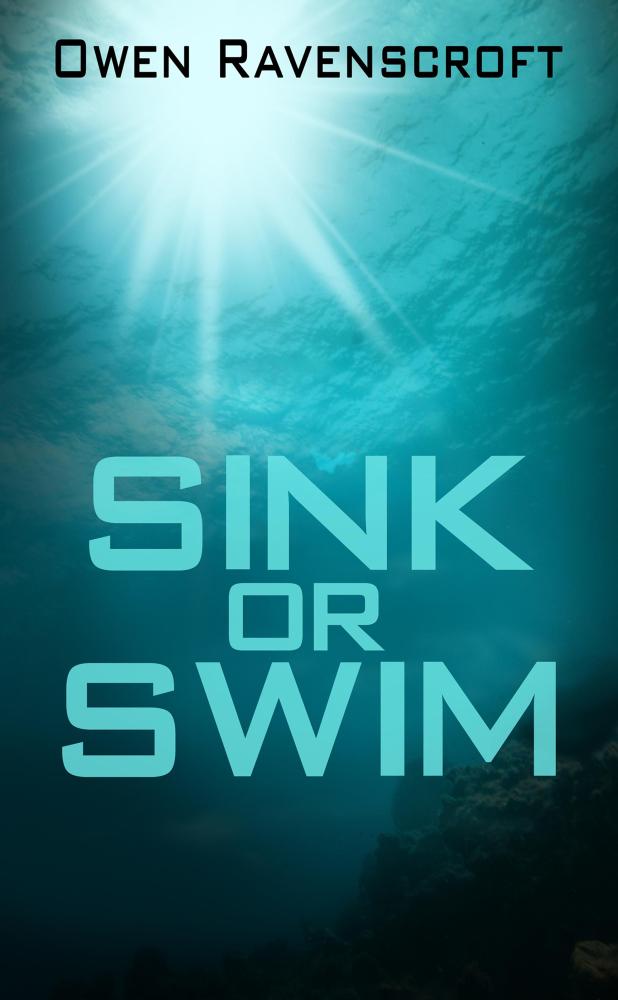 Yes, ‘Sink or Swim’ and writing – how did that begin?
Yes, ‘Sink or Swim’ and writing – how did that begin?
I’ve always enjoyed writing little bits and pieces for a few friends who published journals or newsletters. I’d made the odd contribution to the Herald (Sydney Morning Herald) – I enjoyed doing this.
When I was getting over my hip operation I’d set myself a task each day, perhaps to stop from going crazy. I’d try and do something physical, as best I could, something mental, something around the house. My mental exercise each day was usually just doing word puzzles. I was doing that one morning and Sharelle, my wife said ‘why don’t you write that book?’ and I said ‘oh, ok’.
‘That book’ – how many years had that idea been hanging around?
Fifteen years. The theme is about a once privileged grazing family who through a combination of bad luck and their own ineptness lose the property to the bank. They relocate to a coastal caravan park. Some of them manage quite well, others, not so.
There had been one or two false starts, work or whatever got in the way but the idea was there so I had to give it a go. I sat home and wrote a few pages and Sharelle came home from work and asked what I’d done that day – “I’ve started writing the book”. She said, ‘oh great, give me a look’, read what I had written and said ‘that’s terrible….what’s for dinner?’.
I wasn’t sure what I should do.
Make dinner…?
(Laughs) I thought about it overnight and thought about books I’d enjoyed and how they were written. Tim Winton inspires me, I love his books. I really like ‘Breath’, just the way it was written; the economy of language and just how every single word meant something. Some people have criticised the book for not having the ending it should have but Tim Winton could write a shopping list and I’d salivate. I’m a bit biased in that regard. At any rate, I thought about ‘Breath’ long and hard and the next day I sat down at the desk and wrote another couple of pages and sort of impressed myself, I was ‘I can read this… I like it’. That’s the test I guess – if I can read it and enjoy it then other people might like it.
That’s how I began and if I got stuck and didn’t know where the story was going I’d just go and muck around in the garden or go for a walk on the beach, something like that and think about it. I kept bouncing things off Sharelle without giving too much away because I wanted to surprise her with the finished story. I’m not saying I could have done the book without her but she certainly smoothed the ride. In hindsight I can see how I was extremely lucky how things just came to me.
Did you experience that creative energy that accompanies or ‘fires’ any creator creating something?
If you’d told me about creative energy, talked to me before I started writing, I wouldn’t have believed you, how powerful it is. When I started writing, and I was ‘boiling’, I couldn’t believe it. I really enjoy my surfing and there is no way anything will replace it but writing comes very close. When you’ve got your head down and things are happening on the page, the experience has you bubbling and sizzling, it is amazing.
‘Sink or Swim’ – why this title?
My title for the first draft was ‘Got My Sunshine’ and the reason for that is the main character suffers a lot through depression. Once he moves to the coast and starts utilising the ocean and working in a new environment, experiences a different way of life, he’s often spending reflective time under or near the sun and this is helping him to get through things, to think with a little more clarity. ‘Got My Sunshine’ is actually the title of a very good song by ‘the Mojave 3’.
I started each chapter of the initial draft with a song lyric that related to that chapter. Originally I closed the book with a few lines lifted from ‘Got My Sunshine’. I soon realised that through copyright restrictions to use these lyrics was going to cost me a lot of money. I wasn’t too concerned, the book could survive the loss of the lyrics commencing each chapter but I still wanted that little piece of ‘Got My Sunshine’ to close the book. I’ve been in touch with Universal Studios in the US, Universal Studios here and through a friend I knew I could contact the artist and I knew he would want the money. I was happy to give him the money, but all the people in between didn’t let it happen. Talk about representing the artists’ interest! It just got too hard and I made up a song lyric to finish the book.
I like the title ‘Got My Sunshine’, it’s the one I wanted to use, but once I was progressing a few people in the game weren’t that enthusiastic about it. I began thinking about alternatives and came up with ‘Sink or Swim’. The more I thought about it the more it seemed to fit. It not only related to the geographical circumstances of where they were but also the main characters mindset – he had to swim or he would sink.
It’s set in a current era but could really be any era from the 1970’s on – you see in the book that modern technology comes into play, so that places it in the current era. It begins on the family property in the Riverina. Quite a bit of the book is set at Palm Beach where the main character’s brother and his Spanish wife live. They holiday there at Christmas and end up through another contact in the caravan park at Narrabeen – I’ve changed the name of the park from ‘Lakeside’ to ‘Oceanview’ because the Lakeview caravan park is quite a nice and clean caravan park whereas the park I’ve used isn’t as pristine and not so welcoming.*
So it has a modern setting but has echoes of the 1970’s?
Very much so.
What is your favourite place in Pittwater and why?
I love Palm Beach. There’s a nostalgic element to that but also geographically it’s a beautiful place – it’s quieter. When I get up in the morning I go to Palm Beach and I use the beach in different ways; I’ll walk along the beach, I’ll surf somewhere on the beach, I’ll swim, I’ll go for a walk to the lighthouse, I can use a stand up paddle board on Pittwater – I really use the area and that’s what appeals to me about Palm Beach and apart from the holiday season, there’s not too many people around, you can breathe.
What is your ‘motto for life’ or a favourite phrase you try to live by?
I guess, and it took me a long while to learn as far as a creed to live by, ‘be thankful for small mercies’. If you’ve got healthy kids and your own health and everything is pretty much on an even keel then you’re doing well.
* Camping at Narrabeen ran as a concurrent focus the same Issue the above Profile - to read visit: History page.
Owen at North Avalon. Picture by Mike O'Flynn, 2013.